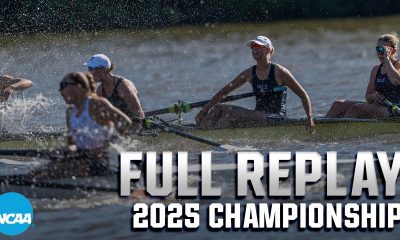NIL
Polis signs bill allowing universities to pay student athletes — but warns about lack of transparency
Gov. Jared Polis signed legislation that will allow universities to pay athletes directly for their name, image and likeness rights, but he added a signing statement asking the legislature to eventually revisit the secrecy around specific payment amounts.CU Boulder argued that making the payment amounts public could result in the harassment of high-profile athletes who […]
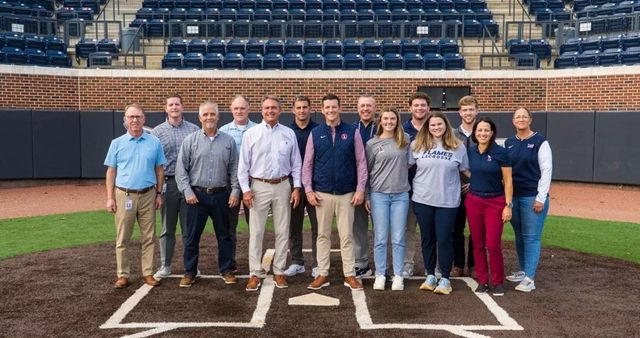
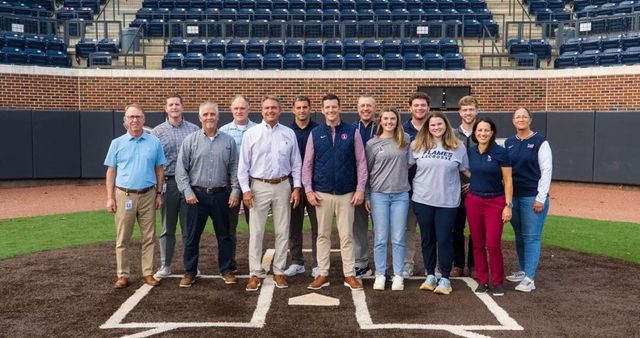

Gov. Jared Polis signed legislation that will allow universities to pay athletes directly for their name, image and likeness rights, but he added a signing statement asking the legislature to eventually revisit the secrecy around specific payment amounts.CU Boulder argued that making the payment amounts public could result in the harassment of high-profile athletes who have a bad game. The NCAA has long warned that with the rise of sports gambling and increased interest in college sports is already subjecting players to abuse. But Roberts said it was nonetheless encouraging that Polis recognizes the trend as something the legislature should revisit.The transparency concerns were bipartisan, but there were never the votes to change the law. Instead, CU Boulder agreed only to publish aggregate amounts by sport.Federal court settlements essentially forced state lawmakers to pass a bill allowing universities like CU Boulder to pay student-athletes for the use of their NIL rights. State law had prohibited the practice. For several years, athletes have been able to sign contracts with third parties like Nike.“It’s better than saying ‘Let’s keep closing things off,’ “ Roberts said with a laugh.Schools have never negotiated for athletes’ name, image and likeness rights, and proponents of transparency said that keeping payments secret would make it impossible to know, for instance, if the athletic director’s child gets a sweetheart NIL deal or if a Black football player were to be paid less than a similarly situated white player.Still, Polis’ statement lamenting the trend against government transparency was curious to Jeff Roberts, the executive director of the Colorado Freedom of Information Coalition.“I have concerns about the bill’s new Colorado Open Records Act (CORA) exception regarding student-athlete contracts,” wrote Polis. “While the bill’s exception is narrowly tailored, it follows an unfortunate trend of legislative proposals that ultimately impede access to official records that are arguably within the public’s interest to view. These exceptions move transparency in the wrong direction and any other proposals that further prevent or delay public access to information will be carefully reviewed.”Polis, he noted, has signed a raft of measures that hide records, including the identities of people who applied for compensation when their property is destroyed by wildlife. And Polis has signed legislation exempting the legislature from open meetings laws.University officials also told lawmakers during bill hearings that Colorado schools would be at a disadvantage, as many states are keeping payments secret, and private universities aren’t subject to open records laws.Universities receive millions in annual revenue from media rights deals to broadcast games, and now the schools will have to share that revenue with the student-athletes. Lawmakers and Polis were in agreement that they must allow the payments, but there was significant debate about whether those payments should be secret.
NIL
OU twins drafted to MLB aim to do something baseball hasn’t seen in decades
As usual, Kyson Witherspoon was first, but eventually, like always, his twin brother Malachi followed. Kyson, who was born just minutes before Malachi, was taken 15th overall by the Boston Red Sox during the 2025 MLB Draft on Sunday. Then, in the second round, Malachi went to the Detroit Tigers with the No. 62 pick. […]

As usual, Kyson Witherspoon was first, but eventually, like always, his twin brother Malachi followed.
Kyson, who was born just minutes before Malachi, was taken 15th overall by the Boston Red Sox during the 2025 MLB Draft on Sunday. Then, in the second round, Malachi went to the Detroit Tigers with the No. 62 pick.
The twins made up two-thirds of the Oklahoma Sooners’ weekend starting rotation this past college baseball season and now have a chance to accomplish something that hasn’t been done since another pair of Sooners. Kyson and Malachi could become the first set of twins to make the MLB after being drafted the same year since 1996, according to MLB.com. The last duo to do it was Ryan and Damon Minor, also from OU.
Malachi and Kyson Witherspoon taken same day in MLB Draft
Kyson and Malachi have taken the same route to this point. They both went to Northwest Florida State College out of Fletcher High School in Neptune Beach, Florida. Both were MLB Draft prospects even in high school, but at that point, Malachi was actually ranked above Kyson.
In 2024, the duo transferred to OU, where Kyson eventually took over as the Sooners’ right-handed ace and emerged as one of the best pitchers in college baseball.
At the end of this past season, Kyson was named a First-Team All-American by Baseball America, D1Baseball, NCBWA and Perfect Game, and was a Second-Team All-American by ABCA. He was also a semifinalist for the Golden Spikes Award, which goes to the best player in college baseball.
Kyson was second in the SEC and No. 22 in the country with a 2.65 ERA in OU’s first season in a new conference. His 124 strikeouts ranked sixth in the country and fifth in the SEC. He tallied a team-high 10 wins with a 10-4 record, which was third-most in the SEC and 11th in the nation. He topped the SEC with a 5.39 strikeout-to-walk ratio.
Malachi, meanwhile, had a 5.09 ERA and 4-8 record as a weekend starter. He was projected to go between the third and fifth rounds before the Tigers jumped on him early in the second.
With Kyson and Malachi getting drafted, OU coach Skip Johnson has now had 29 pitchers taken in the MLB Draft since taking over the Sooners in 2018. Kyson was the fourth first-round pick under Johnson in eight seasons.
Read more about OU baseball
NIL
Argument over ‘valid buisiness purpose’ for NIL collectives threatens college sports settlement
Less than two weeks after terms of a multibillion-dollar college sports settlement went into effect, friction erupted over the definition of a “valid business purpose” that collectives making name, image likeness payments to players are supposed to have. The new College Sports Commission sent a letter to athletic directors last week saying it was rejecting […]
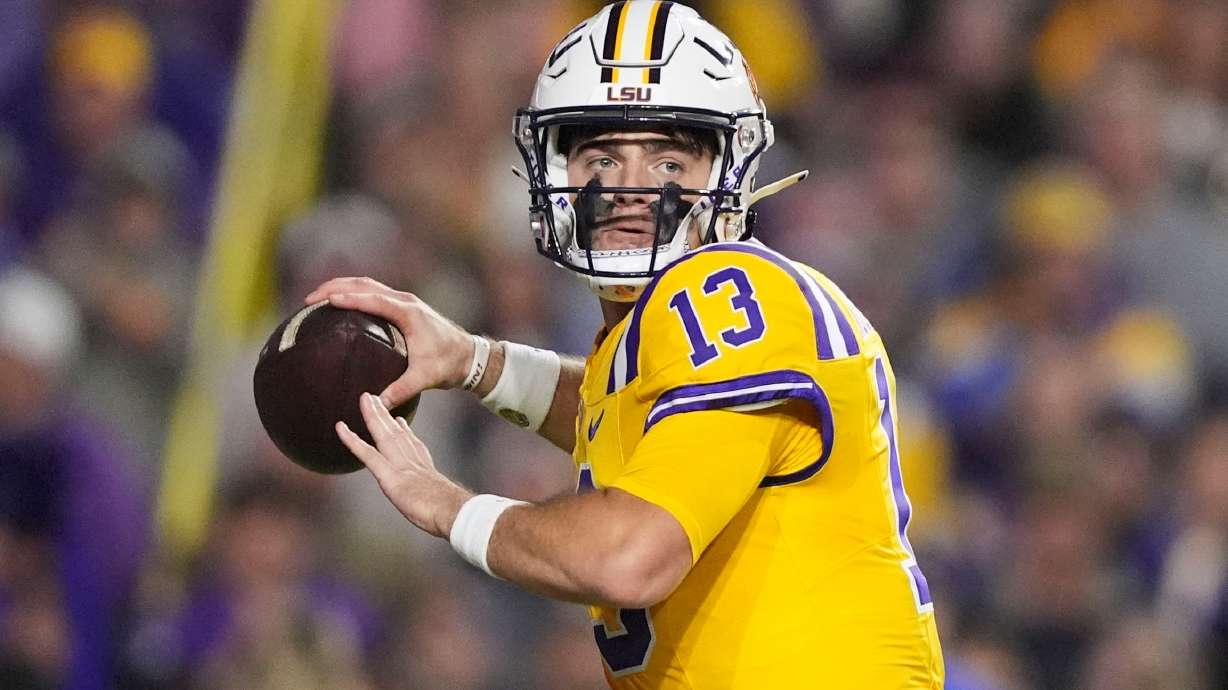
Less than two weeks after terms of a multibillion-dollar college sports settlement went into effect, friction erupted over the definition of a “valid business purpose” that collectives making name, image likeness payments to players are supposed to have.
The new College Sports Commission sent a letter to athletic directors last week saying it was rejecting deals in which players were receiving money from collectives that were created solely to pay them and don’t provide goods or services to the general public for profit.
A lead attorney for the players responded by saying those instructions went against settlement terms and asking the CSC to rescind the guidance.
“This process is undermined when the CSC goes off the reservation and issues directions to the schools that are not consistent with the Settlement Agreement terms,” attorney Jeffrey Kessler wrote to NCAA outside counsel Rakesh Kilaru in a letter obtained by The Associated Press.
Yahoo Sports first reported details of the letter, in which Kessler threatens to take the issue to a judge assigned with resolving disputes involved in the settlement.
Kessler told AP his firm was not commenting on the contents of the letter, and Kilaru did not immediately respond to AP’s request for a comment.
Yahoo quoted a CSC spokesman as saying the parties are working to resolve differences and that “the guidance issued by the College Sports Commission … is entirely consistent with the House settlement and the rules that have been agreed upon with class counsel.”
When NIL payments became allowed in 2021, boosters formed so-called “collectives” that were closely tied to universities to work out contracts with the players, who still weren’t allowed to be paid directly by the schools.
Terms of the House settlement allow schools to make the payments now, but keep the idea of outside payments from collectives, which have to be approved by the CSC if they are worth $600 or more.
The CSC, in its letter last week, explained that if a collective reaches a deal, for instance, for an athlete to appear on behalf of the collective, which charges an admission fee, that collective does not have a “valid business purpose” because the purpose of the event is to raise money to pay athletes, not to provide goods or services available to the general public for profit.
Another example of a disallowed deal was one an athlete makes to sell merchandise to raise money to pay that player because, the CSC guidance said, the purpose of “selling merchandise is to raise money to pay that student-athlete and potentially other student-athletes at a particular school or schools, which is not a valid business purpose.”
Kessler’s letter notes that the “valid business purpose” rule was designed to ensure athletes were not simply being paid to play, and did not prohibit NIL collectives from paying athletes for the type of deals described above.
To prevent those payments “would be to create a new prohibition on payments by a NIL collective that is not provided for or contemplated by the Settlement Agreement, causing injury to the class members who should be free to receive those payments,” Kessler wrote.
___
AP college sports: https://apnews.com/hub/college-sports
NIL
Wisconsin men’s basketball promotes Marc VandeWettering to general manager
Wisconsin Badgers General Manager Marc VandeWettering stands outside the Kohl Center. (Photo credit: UW Athletics) The Wisconsin men’s basketball program is officially stepping into the modern era and doing it with one of its most trusted staffers at the helm. In a press release, the Badgers announced that longtime staffer Marc VandeWettering has officially been […]
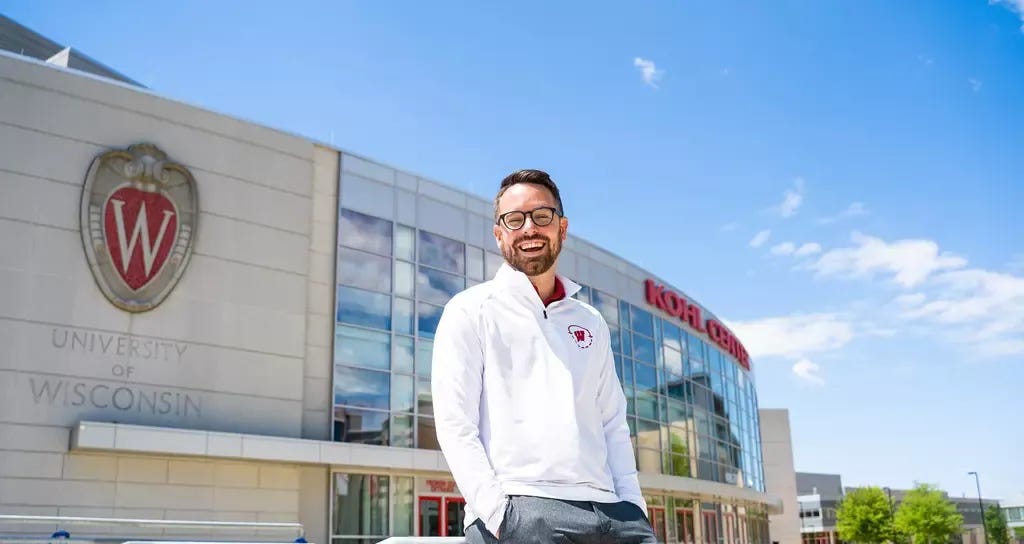

The Wisconsin men’s basketball program is officially stepping into the modern era and doing it with one of its most trusted staffers at the helm.
In a press release, the Badgers announced that longtime staffer Marc VandeWettering has officially been promoted to general manager. This formally establishes VandeWettering in a role that, if we’re being honest, he’s been preparing for and serving in for quite some time.
It’s not just a title change for VandeWettering. It’s Wisconsin signaling that they understand the realities of the college basketball landscape — a landscape shaped by the transfer portal, NIL collectives, player agents, roster management, and nonstop recruiting battles that leave little to no room for programs stuck operating in the past.
In this new position, VandeWettering will work directly alongside head coach Greg Gard to oversee recruiting strategy, player personnel, roster construction, and NIL revenue-sharing efforts, all while continuing to handle non-conference scheduling.
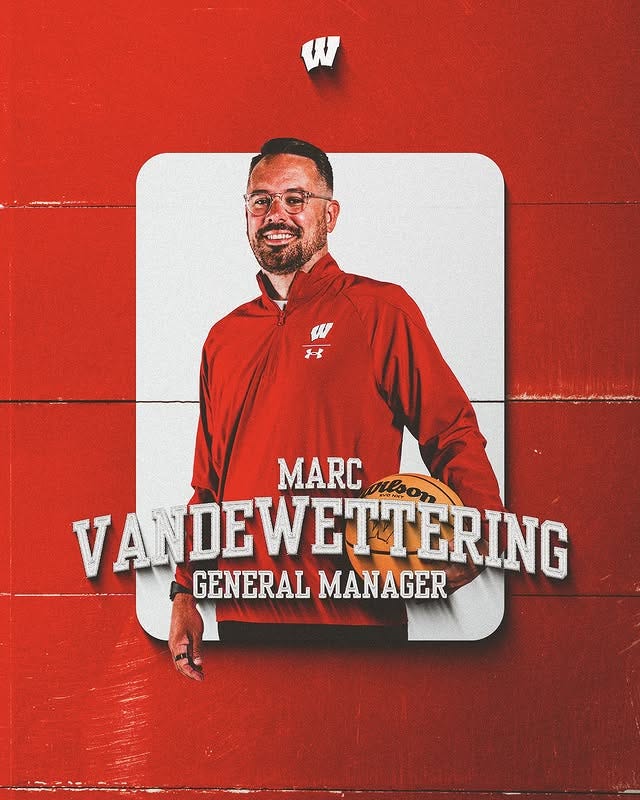
“I’m extremely happy for Marc and our program,” Gard said. “He has worked tirelessly to make us better every day and has helped us navigate this new era of college basketball very successfully. Marc has been a central figure in our evolution as a program and has already been handling many of the personnel tasks for the last couple of years. Looking to the future, I’m excited to have Marc officially elevated to this administrative role and know that he will help drive our sustained success.”
And if you’re wondering just how big of a deal this is, let’s break it down.
College basketball today doesn’t look anything like it did even five years ago. The introduction of NIL has flipped the power dynamics, with players now able to monetize their name, image, and likeness, and schools scrambling to build infrastructure around collectives and brand-new revenue-sharing models. Add in the transfer portal, where hundreds of athletes jump programs every offseason, and you’re looking at roster movement that rivals professional sports but without any guardrails.
In the NBA or NFL, you have a full front office: general managers, scouts, cap experts, analysts, and agents. In college? Those responsibilities often fall on the shoulders of a small coaching staff already tasked with running practices, preparing game plans, and developing players.
That’s where roles like VandeWettering’s come in.
What makes this move especially smart is that Wisconsin isn’t just reacting to the chaos of the new system; they’ve been proactively creating structure. They’ve given Gard someone he trusts implicitly to handle the nitty-gritty: conversations with player families, managing NIL expectations, evaluating portal fits, finding roster balance, and working through the agent-like representatives now involved at the college level.
For VandeWettering, it’s the culmination of more than a decade inside the Badgers basketball program.
A native of Kaukauna, Wisconsin, VandeWettering began his journey as a student manager and was the head manager during Wisconsin’s 2013–14 Final Four season under head coach Bo Ryan. After gaining additional experience as the assistant director of basketball and football operations at the Big Ten office, where he helped run championship events across multiple sports, VandeWettering returned home to Wisconsin in 2017 as the program’s director of operations.
By 2023, VandeWettering was serving as the Badgers’ chief of staff, quietly shaping the team’s day-to-day functions and already playing a key role in personnel matters. This promotion just makes it official.
“I’m incredibly grateful for the opportunity to support Coach Gard, our staff, and our student-athletes in this role,” VandeWettering said in the press release. “Wisconsin Men’s Basketball is built on a foundation of consistency, accountability, and a team-first approach — and I’m committed to helping us build on that legacy. Our focus is on sustaining the high standards of this program while continuing to evolve and position ourselves for long-term success in a changing landscape.”
And let’s be clear: this “changing landscape” isn’t just coachspeak.
Every major college basketball program now has to navigate the delicate balance between retaining homegrown talent and bringing in outside help through the portal to compete. It’s a win-now era. They need someone monitoring NIL deals to ensure players feel valued without fracturing the locker room. They need someone to network with collectives and administrators to keep the financial machine running. They need someone to scout the portal and high school ranks during the season to identify gaps, not just for the next season, but for multiple seasons down the line.
VandeWettering is that someone for Wisconsin.
This offseason alone has shown just how critical these roles are. The Badgers had to reload their roster after a myriad of notable departures with hand-picked portal additions that fit the system and culture, all within the basketball program’s financial constraints.
But beyond the transactions, this move reflects the broader plan that Gard set in motion a while back.
Gard has effectively reshaped Wisconsin’s basketball infrastructure, adding dedicated roles like Kirk Penney as offensive coordinator, Lance Randall for his range of coaching experience, and Greg Stiemsma for player development. Bringing on Isaac Wodajo as director of recruiting and scouting further shows how intentional Gard has been about elevating the program into a modern operation — without losing the cultural foundation that’s defined Badgers basketball for decades.
VandeWettering, in many ways, is the glue guy behind it all.
Gard has no intention of stepping back from the action, that much he’s made clear. That said, having a general manager-level figure in the front office gives him the ability to stay plugged in without drowning in an administrative overload. It allows the staff to be more nimble, more aggressive, and, importantly, more prepared as things keep shifting.
In the arms race of modern college hoops, you either adapt or you get left behind.
“I want to be able to control—or at least have a say—on who’s coming in and who’s going out of our program,” Gard said. “I give a lot of responsibility and voice to my staff.”
With VandeWettering now officially steering the ship on the front office side of things, Wisconsin isn’t just keeping pace — they’re setting themselves up to succeed for the long haul, with someone who understands the pillars this program was built on. And for a program built on consistency, accountability, and development, that’s exactly the kind of evolution that can keep the Badgers competitive for years to come.
This promotion may be behind the scenes, but its impact will be felt in every corner of the Wisconsin men’s program.
We appreciate you taking the time to read our work at BadgerNotes.com. Your support means the world to us and has helped us become a leading independent source for Wisconsin Badgers coverage.
You can also follow Site Publisher Dillon Graff at @DillonGraff on X.
NIL
adidas, St. John's partner thanks to men's college basketball's revival
St. John’s meteoric return to national prominence in college basketball under coach Rick Pitino has made it a very desirable investment. It’s the reason the sneaker and apparel giant adidas sought to make the Red Storm its first college partner that doesn’t have a Bowl Championship Subdivision football program. They unveiled their new partnership on […]


St. John’s meteoric return to national prominence in college basketball under coach Rick Pitino has made it a very desirable investment. It’s the reason the sneaker and apparel giant adidas sought to make the Red Storm its first college partner that doesn’t have a Bowl Championship Subdivision football program.
They unveiled their new partnership on Monday through a video posted on social media platforms that featured Pitino, as well as several Storm players, in adidas gear sitting on a bench and each opening a newspaper with the front page headline “ADIDAS EYES RED STORM.”
Born in Queens, backed by the three stripes.
Welcome to the family. adidas is proud to become the official partner of @StJohnsRedStorm. pic.twitter.com/RTeMWYC1m7
— adidas Basketball (@adidasHoops) July 14, 2025
As part of the partnership, St. John’s will receive a major investment in their athletics department and student-athletes will have an avenue to a company program that will give them opportunities to earn NIL money doing endorsements. Two players — Ian Jackson and Joson Sanon — already are part of the program.
“This is a period of time where it’s all about revenue generation for college athletics and all about NIL and adidas gets it,” St. John’s AD Ed Kull told Newsday. “[It] has a whole program that’s focused around NIL and giving dollars for endorsement deals to student-athletes. And they understand for the school the challenges of revenue sharing and generating money and they really stepped up. And . . . want to be all in.”
Nike, the previous outfitter for St. John’s, has reduced its portfolio for outfitting college programs and, though it had the opportunity to counter adidas’ offer to St. John’s, chose not to, Kull said.
“I know we’ve changed brands over the years — from Jordan Brand to Nike Elite to Under Armour to Nike now this — but it’s truly in our best interest we have a partner that is investing in us and building with us. Nike was not doing that.”
The appeal of St. John’s playing in the New York market made the partnership even more appealing to the shoe giant. The Red Storm will play at least a dozen games next season at Madison Square Garden.
“Partnering with a renowned institution in St. John’s University represents an exciting moment for adidas,” adidas Vice President of Sports Marketing Chris McGuire said in a school-issued statement. “As a powerhouse with deep roots and big ambition, they match our drive to push limits and shape the future of sport.”
The flagship men’s and women’s basketball programs will have game-day uniforms, footwear, apparel and equipment for training and competition designed by adidas.
St. John’s fans can buy Red Storm merchandise from adidas online already and the men’s basketball program will be part of an event on Wednesday at 4 p.m. at the recently relaunched adidas Brand store at 610 Broadway in Manhattan.
“This move to adidas was the worst-kept secret, but the holdup in the launch was making sure that we launched and you could buy [gear] right away,” Kull said.
Kull also said that fans who were frustrated about the lack of availability of the various official Nike uniforms will be offered a wider variety, including alternate uniforms, though he couldn’t give details yet on the Felipe Lopez-era throwbacks.
Kull said fans will eventually see a one-stop shop where they will be able to purchase one of the uniforms that are personalized with their favorite players’ names and numbers.
NIL
Syracuse replaces ACC Kickoff participants, still sending Rickie Collins Jr.
Syracuse, N.Y. — Fran Brown is calling an audible on which players will join him next week at ACC football media day. Quarterback Rickie Collins Jr. will still join Brown in Charlotte, but defensive back Duce Chestnut, linebacker Derek McDonald and defensive lineman Dion “Tank” Wilson Jr. are being replaced by defensive back Berry Buxton […]

Syracuse, N.Y. — Fran Brown is calling an audible on which players will join him next week at ACC football media day.
Quarterback Rickie Collins Jr. will still join Brown in Charlotte, but defensive back Duce Chestnut, linebacker Derek McDonald and defensive lineman Dion “Tank” Wilson Jr. are being replaced by defensive back Berry Buxton III, punter Jack Stonehouse and tight end Dan Villari.
The ACC asked schools to notify the conference which players would be in Charlotte months ago. At the time, Brown chose McDonald, Chestnut and Wilson.
Brown has since changed his mind and submitted the new list over the weekend, a team spokesperson said Monday.
The change up is not a punitive action, the spokesperson said, and none of the original players opted out of the trip. Brown opted to bring Syracuse’s most experienced leaders, the spokesperson said.
Villari, Buxton and Stonehouse are all redshirt seniors.
The ACC also requested teams bring a quarterback, explaining why Collins will make the trip. Stanford, Pitt, Wake Forest and Boston College are the only teams that aren’t sending a quarterback to ACC Kickoff.
This year’s ACC Kickoff runs from July 22-24. Brown and his players will take the podium on July 23 live from the Hilton hotel in Uptown Charlotte.
The ACC Kickoff will stream live on the ACC Network and syracuse.com will deliver on-the-ground coverage.
If you purchase a product or register for an account through a link on our site, we may receive compensation. By using this site, you consent to our User Agreement and agree that your clicks, interactions, and personal information may be collected, recorded, and/or stored by us and social media and other third-party partners in accordance with our Privacy Policy.
NIL
adidas, St. John’s partner thanks to men’s college basketball’s revival
St. John’s meteoric return to national prominence in college basketball under coach Rick Pitino has made it a very desirable investment. It’s the reason the sneaker and apparel giant adidas sought to make the Red Storm its first college partner that doesn’t have a Bowl Championship Subdivision football program. They unveiled their new partnership on […]
St. John’s meteoric return to national prominence in college basketball under coach Rick Pitino has made it a very desirable investment. It’s the reason the sneaker and apparel giant adidas sought to make the Red Storm its first college partner that doesn’t have a Bowl Championship Subdivision football program.
They unveiled their new partnership on Monday through a video posted on social media platforms that featured Pitino, as well as several Storm players, in adidas gear sitting on a bench and each opening a newspaper with the front page headline “ADIDAS EYES RED STORM.”
Born in Queens, backed by the three stripes.
Welcome to the family. adidas is proud to become the official partner of @StJohnsRedStorm. pic.twitter.com/RTeMWYC1m7
— adidas Basketball (@adidasHoops) July 14, 2025
As part of the partnership, St. John’s will receive a major investment in their athletics department and student-athletes will have an avenue to a company program that will give them opportunities to earn NIL money doing endorsements. Two players — Ian Jackson and Joson Sanon — already are part of the program.
“This is a period of time where it’s all about revenue generation for college athletics and all about NIL and adidas gets it,” St. John’s AD Ed Kull told Newsday. “[It] has a whole program that’s focused around NIL and giving dollars for endorsement deals to student-athletes. And they understand for the school the challenges of revenue sharing and generating money and they really stepped up. And . . . want to be all in.”
Nike, the previous outfitter for St. John’s, has reduced its portfolio for outfitting college programs and, though it had the opportunity to counter adidas’ offer to St. John’s, chose not to, Kull said.
“I know we’ve changed brands over the years — from Jordan Brand to Nike Elite to Under Armour to Nike now this — but it’s truly in our best interest we have a partner that is investing in us and building with us. Nike was not doing that.”
The appeal of St. John’s playing in the New York market made the partnership even more appealing to the shoe giant. The Red Storm will play at least a dozen games next season at Madison Square Garden.
“Partnering with a renowned institution in St. John’s University represents an exciting moment for adidas,” adidas Vice President of Sports Marketing Chris McGuire said in a school-issued statement. “As a powerhouse with deep roots and big ambition, they match our drive to push limits and shape the future of sport.”
The flagship men’s and women’s basketball programs will have game-day uniforms, footwear, apparel and equipment for training and competition designed by adidas.
St. John’s fans can buy Red Storm merchandise from adidas online already and the men’s basketball program will be part of an event on Wednesday at 4 p.m. at the recently relaunched adidas Brand store at 610 Broadway in Manhattan.
“This move to adidas was the worst-kept secret, but the holdup in the launch was making sure that we launched and you could buy [gear] right away,” Kull said.
Kull also said that fans who were frustrated about the lack of availability of the various official Nike uniforms will be offered a wider variety, including alternate uniforms, though he couldn’t give details yet on the Felipe Lopez-era throwbacks.
Kull said fans will eventually see a one-stop shop where they will be able to purchase one of the uniforms that are personalized with their favorite players’ names and numbers.
-

 Technology3 weeks ago
Technology3 weeks agoPet fitness and wellness trends for a healthier and happier dog
-

 College Sports3 weeks ago
College Sports3 weeks agoWAC to Rebrand to UAC, Add Five New Members in 2026
-

 Motorsports2 weeks ago
Motorsports2 weeks agoWhy Cosmetics are Making Up for Lost Time in Women’s Sports
-

 College Sports3 weeks ago
College Sports3 weeks agoA new era of Dickinson hockey begins behind the bench – The Dickinson Press
-

 Health3 weeks ago
Health3 weeks agoFlorida assault survivor shares hope for change with new mental health law
-
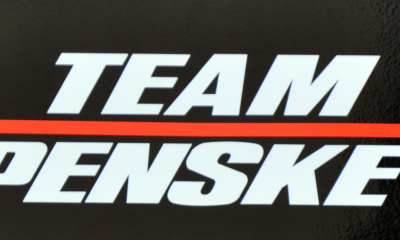
 Motorsports1 week ago
Motorsports1 week agoTeam Penske names new leadership
-

 Motorsports3 weeks ago
Motorsports3 weeks agoNASCAR This Week – Patriot Publishing LLC
-

 Sports3 weeks ago
Sports3 weeks agoHow to Market FAST Sports Content to New Audiences
-

 Youtube2 weeks ago
Youtube2 weeks agoBREAKING: NBA MVP Shai Gilgeous-Alexander signs the RICHEST annual salary in league history
-

 Sports6 days ago
Sports6 days agoNew 'Bosch' spin
















